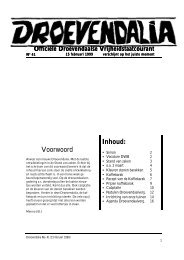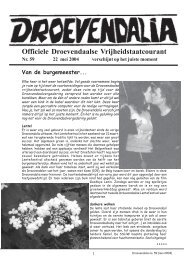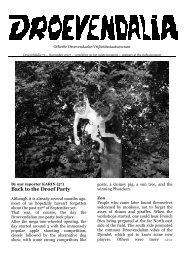Droevendalia 78: June 2009 - Droevendaal
Droevendalia 78: June 2009 - Droevendaal
Droevendalia 78: June 2009 - Droevendaal
Create successful ePaper yourself
Turn your PDF publications into a flip-book with our unique Google optimized e-Paper software.
Self-rule?<br />
Gandhi inspires me since a very young age. What makes him so special to me, is that he showed with his own<br />
life, how real idealism can become. His example can maybe give us new ideas and inspiration for our own way<br />
of life. Therefore I will shortly summarize a small part of his philosophy, which may be interesting to you, to<br />
get to know Gandhi a bit more.<br />
His idea of power, fits many of us I guess: “Power resides in the people. Parliaments have no power or<br />
even existence independently of the people.” (So does Idealis.) “Civil disobedience is the storehouse of power.<br />
People unwilling to conform to the laws of the legislature, and prepared to suffer the consequences of noncompliance,<br />
they will bring the whole legislative and executive machinery to a standstill.” (As Gandhi showed<br />
the world in 1930/31 with his salt march, where millions broke the salt laws, filling prisons and paralyzing the<br />
government).<br />
Freedom was one of Gandhi's main objectives, “swaraj (self-rule) meant a mutual liberation from the<br />
domination-submission symbiosis.” He explained, that the outward freedom, that we shall attain will only be<br />
in exact proportion to the inward freedom to which we may have grown at a given moment. This inward<br />
freedom requires a personal journey, a search for self-knowledge that liberates one from the sort of fear and<br />
insecurity that fuels both the desire to dominate or to be dominated. Gandhi's struggle for swaraj, is infinitely<br />
greater than and includes independence, because it means not merely “a change of government” but “a real<br />
change of heart at the part of the people”.<br />
Gandhi's famous methods for attaining this freedom: Truth and nonviolence are the means for<br />
establishing social reforms (constructive programmes). Gandhi's constructive programmes focused on<br />
swadeshi (self-reliance) and sarvodaya (welfare for all, economic equality), this leads to true freedom. In<br />
Gandhi's words: “No one can be free until all are free, liberty must imply equality and the only method of<br />
achieving this is through nonviolence.”<br />
The mahatma wrote no fewer than a hundred volumes, but if you really want to get to understand his<br />
philosophy, better take his own words into account: “My actions alone are the greatest exposition of truth<br />
and nonviolence. Those who believe in these can propagate them only by following them in practice. They<br />
call for no books.”<br />
Gandi's Satyagraha ashram (an 'ashram' is a kind of community) had the following objective: “that its<br />
members should qualify themselves for, and make a constant endeavor towards, the service of the country,<br />
not inconsistent with the universal welfare.” I selected some of the ashram observances, which are seen as<br />
essential for the fulfillment of the above ashram objective:<br />
- Truth: worshippers of Truth may not resort to untruth<br />
- Non-violence or love; The active part of non-violence is Love. The law of love requires equal consideration<br />
for all life, from the tiniest insect to the highest man. He must thus love the wrongdoer, but he must never<br />
submit to is wrong or his injustice. Satyagraha is a weapon of the strong; it admits of no violence under any<br />
circumstance whatever; in thought, word and deed.<br />
- Control of the palate: eating is necessary only for sustaining the body and keeping it a fit instrument for<br />
service and must never be practiced for self-indulgence.<br />
-Stealing: It is also theft if one receives anything which one does not really need.<br />
-Physical labour: man can be saved from injuring society, as well as himself, only if he sustains his physical<br />
existence by physical labour.<br />
- Swadeshi (self-reliance): ”He therefore serves the world best by first serving his neighbour.” “Observances<br />
for swadesi makes for order in the world; the breach of it leads to chaos.”<br />
- Fearlessness: “A satyagrahi enjoys a degree of freedom not possible for others, for he becomes a truly<br />
fearless person.”<br />
-Tolerance<br />
Although Gandhi might seem somewhat extreme, with his vow of celibacy, his days of silence and his<br />
enduring fasts, most of his views, for instance on power, freedom and community life are timeless for me.<br />
Maybe once, we are also ready for real self-rule. Until then I am happy to enjoy now our 'vrijstaat'<br />
<strong>Droevendaal</strong>. Mirre (87)<br />
Samenvatting: Zelfbestuur?<br />
Gandhi liet door zijn eigen leven zien hoe idealen realiteit kunnen worden. Zijn ideeën betroffen onder andere<br />
eerlijkheid, geweldloosheid, tevreden zijn met wat je nodig hebt, jezelf blijven door fysiek werk te verrichten,<br />
jezelf verwerkelijken door anderen te dienen, geen angst hebben (vanuit je vrijheid) en tolerantie.<br />
Dit zijn verreikende en tijdloze idealen; in onze 'vrijstaat' <strong>Droevendaal</strong> kunnen we daar alvast een snufje van<br />
proberen te proeven.<br />
3









